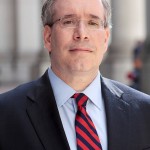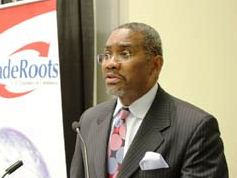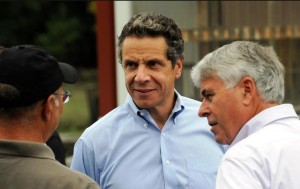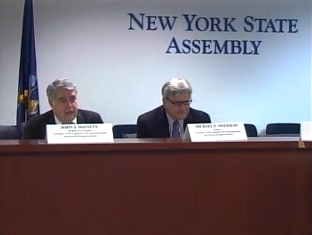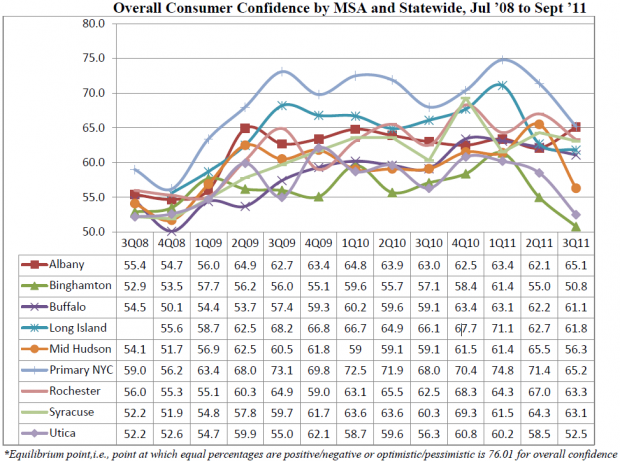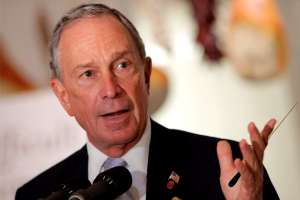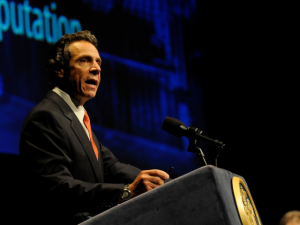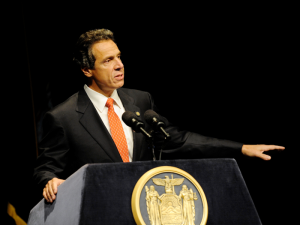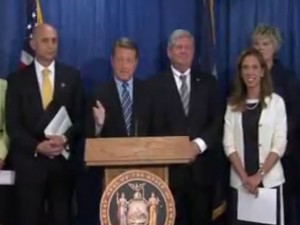Colby Hamilton appears in the following:
Assemblyman Hakeem Jeffries filed papers for potentional congressional run
Wednesday, October 05, 2011
(h/t Greg Giroux at Bloomberg)
Civil rights advocates propose their own redistricting maps
Wednesday, October 05, 2011
As we've noted before, the redistricting process is more than simply Democrats and Republicans carving out the most advantageous districts for themselves. For communities--especially ones that have historically been under served--this once-a-decade process provides an opportunity to push for political boundaries that take their interests into account.
This week a coalition of minority civil rights and social justice groups made a direct appeal for those interests. The Asian American Legal Defense and Education Fund, LatinoJustice and others have come out with their own maps for New York State Assembly and Senate districts. The commission in charge of drawing the lines, LATFOR, has put out a call for maps previously.
These "communities of interest" maps stuck to the basic redistricting rules--no more than a plus or minus five percent population variance, conforming to the Federal Civil Rights Act rules on protected minority communities (duh), while trying to create districts in New York City that, in their words, "reflects [the city's] changing demographics and protects the voting rights of Blacks, Latinos, and Asian Americans."
The new maps, in essence, boost the number of minority majority districts. Specifically:
- Increasing the number of majority Asian American Assembly districts from one to four--three in Queens and one in Brooklyn.
- Creating a majority Asian American Senate district out in Flushing, and increasing the percentages of Asians in two other districts. Currently there are no majority Asian American Senate districts in the city.
- Going from two to five majority Latino Assembly districts, with two districts being created in northern Manhattan and one out in Queens.
- In the Senate, there would be two additional Latino majority districts--on centered in the Bushwick neighborhood in Brooklyn, and a redrawn district in the Bronx.
- Majority African American districts throughout the city have been preserved.
The new maps are below.
According to AALDEF's executive director Margaret Fung, the maps have been submitted to the LATFOR committee. She said the committee was expected to present its first draft map in early November, with a new round of public comment after. After that the process often devolves into legal limbo, as the Department of Justice has to review and clear the lines, and lawsuits are filed by groups who felt the process violated their rights.
It's through that lens these maps can be partially viewed.
"If for some reason the legislature does not adopt a map that protects the voting rights of communities of color, we would obviously have to consider taking legal action," Fung said.
This isn't to say LATFOR won't take the maps into account. In fact, it could make their lives a lot easier. Of course, there is one group who will likely not be pleased by the maps: the incumbents who could see radically different voters under these new lines. All of the districts were drawn, as they say, "incumbent blind."
Liu blasts mayor's living wage bill study
Wednesday, October 05, 2011
Comptroller John Liu is weighing in on what's amounting to a controversial report produced by the city's Economic Development Corporation that called the positive affects of a proposed mandatory wage bill for city-sponsored development projects "negligible."
The city council has supported a bill, with modifications, that labor allies are pushing for the council to pass. The mayor has steadfastly opposed any living wage legislation.
Today, labor supportive groups have been pushing back on the report, calling it flawed and dubious. So is Liu, who has close ties to labor:
This million dollar report is so flawed it’s not worth the bandwidth for a download. The EDC’s claim that a living wage kills jobs shows just how distorted the agency’s perspective has become. The proposed living wage would be a requirement on new projects that are heavily subsidized by taxpayers and would create new jobs that pay decent wages. The claim of job losses is rhetoric at its worst.
Governor Cuomo's week in New York City
Wednesday, October 05, 2011
Governor Andrew Cuomo has been in New York City since last Wednesday, according to his daily public schedule. But he hasn't had a single public event. So what has the governor been doing with his time?
A call has been placed with his office. When we get an answer, we'll let you know.
ScarJo headlines Stringer fundraiser
Wednesday, October 05, 2011
ICYMI: screen starlet, and born-and-bred Manhattanite, Scarlet Johansson hosted a fundraiser for Manhattan Borough President Scott Stringer's 2013 mayoral bid earlier this week. A lot of the press focused focused on the event like it was a peculiarity, but as we've written about before, the Stringer 2013 team is proving highly adapt at capturing headlines and taking up air in the 2013 mayoral room.
Or, as Ms. Johansson put it in New York magazine's Daily Intel blog:
"It's always inspiring to see voters get behind the lesser known, less trendy candidate, but I have to say, after tonight's success, that won't be the case any longer," said Johansson, standing next to Stringer at a venue better known for the Olsen twins and a tough door.
State's second highest court hears arguments in prisoner redistricting case
Tuesday, October 04, 2011
The New York Supreme Court heard oral arguments today in the lawsuit to overturn a law passed by the 2010 Democratic legislative majority that would count prison inmates in the communities they are from, instead of in the towns and counties where they're incarcerated.
The lawsuit was brought by six Senate Republicans--many of whom would be affected by the law--who are claiming, among other things, that the prisoners must be counted where the US Census counts them (in predominately upstate prisons).
Attorney General Eric Schneiderman's office, as well as lawyers for NAACP Legal Defense Fund and the Brennan Center for Justice, argued in favor of the law, saying that prisoners are counted back in their pre-incarceration communities for other official tallies and political districts should be no different. Dale Ho, the lawyer representing the NAACP LDF, said he felt confident the judge understood their perspective.
"The judge had some questions about whether or not it was rational to count prisoners as continuing residents in their home communities," Ho said. "The point that we tried to make clear to him--and I think he understood this--is that prisoners are treated as continuing residents of their home communities for virtually ever legal puprose."
That would include, Ho said, things like court jurisdiction in their cases or family law, as well as voting rights. "Some incarcerated individuals retain their voting rights," Ho noted. "They vote not at the address where the prison facility is located. They vote by absentee ballot in their home communities."
The Senate Republican attorney David Lewis was not available for comment, but Senate staffer, who had spoken with Lewis, said the judge, Eugene Devine, did indeed have questions for the defense, interrupting their explanations to ask clarifying questions. The Republican source said the senate plaintiffs were taking this as a good sign, suggesting the judge might have found the reasoning suspect.
Devine has 60 days to render a decision. In the meantime, the redistricting process continues. The Senate Republicans representative on the commission responsible for redistricting, Senator Michael Nozzolio, has said LATFOR will follow the law as it stands.
Brenda Wright, director for Demos--one of the groups supporting the law--said she hoped LATFOR will honor that pledge.
"We certainly hope the judge will issue a decision to dismiss the legal challenge that's been filed so the process can unfold as its intend to," Wright said. "We presume and we hope that LATFOR will complete the process of identifiying the home addresses [for prisoners] to the greatest extent possible."
Queens Dems: There was no secret Meeks meeting
Tuesday, October 04, 2011
Congressman Greg Meeks (Courtesy of the Congressman's website)
According to a number of individuals, both elected officials and long-time political observers, the secret meeting held to decide the successors to embattled Queens Congressman Greg Meeks never happened.
"The article was bullshit," said one Democratic consultant, who asked not to be identified.
One elected official who would potentially have a lot to gain if the Post report was true also denied the meeting took place. Councilman Leroy Comrie, who was said to be in line for a promotion to the state Senate after Malcolm Smith ascended to Congress, called the story a "fabrication", saying he couldn't imagine who would have been the Post's reported sources.
"That's just never the way it works," Comrie said. He went on to say that support for Meeks continued, and talks about him stepping down were unfounded. "No one has had any discussion--serious discussions, formal or informal--other than being supportive of him," the councilman said.
Yesterday, Queens County Democratic leader and central figure to the Post story, Congressman Joe Crowley, also denied any such meeting took place. While all those interviewed for this article agreed, it didn't stop some from agreeing with the central thesis of the article: Were Meeks to be forced or persuaded to step down, the county leadership would be left with slim pickings.
Malcolm Smith, himself, came under heavy scrutiny for his connections to the Aquaduct racino scandal of last year. His associations with people tied to the winning developer, AEG, have left many ethical questions unanswered. Even if the supposed meeting never took place, the cast of characters involved left more than one person questioning the decision making process of the Queens Democratic Party at the highest levels.
The coming crunch on New York's local governments
Tuesday, October 04, 2011
The Pew Center's state government blog Stateline has a great piece on Indiana and New York's battle to shrink local governments across the state. Here in New York, Governor Cuomo has been, for years, putting the pieces together for a major reduction and consolidation of the state's layer cake of overlapping governments.
This will be a story that continues to develop, as the new local tax cap is scheduled to take affect next year--something town mayors, county executives and others are starting to voice concerns about.
From the article:
Unlike in Indiana, cities, towns and counties in New York face strict mandates from the state on collective bargaining, binding arbitration, and wage, pension and benefit obligations. Municipal leaders have long argued that these mandates bear heavy responsibility for the cost of local government — and hence for rising property taxes. A December, 2010 report from the state Conference of Mayors, “You Can’t Cap What You Can’t Control,” pointed out that city pension and health insurance costs were due to rise $206 million in the next two years — while a 2 percent property tax cap, which is what eventually passed, would allow only $39 million in additional levies.
Cuomo created a “mandate relief redesign team,” and the state’s municipal leaders pressed the legislature hard on the issue, but in the end the tax caps passed without significant mandate relief. “The property tax is one of the most regressive and onerous taxes you can put in place,” says Sam Teresi, the mayor of Jamestown, a city of 31,000 in the far western corner of New York. “I for one do not oppose the notion of a property tax cap. But the legislature passed the tax cap as a standalone item, broke their arms patting themselves on the back, and left town without taking up mandate relief. If all you’re doing is choking off revenues for local governments and not allowing us to go in and attack the problem on the expenditure side of the ledger, then you’re going to be seeing municipal insolvencies around the state.”
The whole piece is worth a read. You can find it here.
NYCLU goes to court over NYPD's Muslim surveillance
Monday, October 03, 2011
The New York Civil Liberties Union announced today it is asking a Federal court for access to information about the NYPD's secret surveillance program that targets Muslim communities throughout the New York City area.
“The NYPD’s reported surveillance of local Muslim communities raises serious questions concerning whether the Police Department has violated court-ordered restrictions on its ability to spy on and keep dossiers on individuals,” said NYCLU Legal Director Arthur Eisenberg in a statement. “In order to know whether the NYPD is violating the court order, we need a more complete explanation of the NYPD’s surveillance practices.”
The police department has denied such activities are happening. This is contrary to a series of Associated Press reports of a CIA-supported secret unit inside the NYPD that has targeted Muslim communities. NYCLU wants to go through the discovery process to see if the unit's activities violate a decades-old decree that restricts the department's ability to conduct surveillance against people based on political and religious activity.
One of the big questions this story has raised is how much Mayor Bloomberg was involved in creating, authorizing or monitoring the activities of this special unit. Bloomberg has never outright confirmed such a unit exists in the NYPD, despite reports detailing the unit's existence and how it's monitored Muslim communities after September 11, 2001.But the mayor has generally supported the work of the department when it comes to monitoring groups and communities.
Bloomberg describes New York City as an immigrant-friendly city. It was reported today that the Mayor's office is even backing the city council's resistance to Federal efforts to deport undocumented immigrants after being released from prison. Presumably, during depositions of those involved in the Muslim surveillance program, the extent to which the mayor was involved or informed about the program could be revealed.
Beyond red and blue: Redistricting and the deeper fight for 'nonpartisan' lines
Monday, October 03, 2011
Assemblyman McEneny, left, and Senator Nozzolio, right, at the Manhattan LATFOR meeting earlier this month. (Courtesy of the LATFOR Committee.)
Depending on where you stand, the decennial redistricting process can be synonymous with high-stakes political gamesmanship, craven partisan manipulation, or the most boring of insider political baseball. Regardless of which version you favor, it's usually cast through the two-toned prism of Republican versus Democratic interests battling it out for control of political turf.
But that blue or red-hued view often overlooks the regional and demographic dimensions of redistricting. For starters, there are significant differences between the interests of upstate and downstate New York that go beyond just the typical partisan split.
“Downstate, the focus can sometimes shift to…a demographic point of view," said Ryan Moses, former New York State Republican Party executive director and currently partner with the Albany-based political consulting firm Capitol Public Strategies. “Which is a little different from upstate, where the population is less diverse, but just more focused on making sure it [redistricting] makes more sense geographically."
Typically the divide is along partisan lines, with upstate, often Republican-leaning areas more concerned with the way towns and counties are divided, and downstate, often Democratic-leaning districts taking racially and ethnically-based “communities of interests” into account. But the partisanship, says Moses, is only part of the political picture.
“There's politics at play there,” he said. “Maybe not Republican-Democrat politics, but certainly ethnic politics, which, in New York, as you know, is a big factor."
Downstate racial and ethnic interests are hoping to become even bigger factors in the redistricting process. In a sense, this is a one-shot process: political lines are being drawn for the next ten years, and this is a singular opportunity to get what they see as their rightful slice of the political pie. For them, the partisanship is secondary, which puts them directly in the path of the traditional redistricting process.
Consumer confidence falls across most of NY: Siena
Monday, October 03, 2011
According to a new Siena Research Institute poll, consumer confidence has fallen in eight out of nine regions across New York. Only the Albany area saw a surge in confidence, up three points from the last poll to 65.1 percent, making the Capital Region the second most confident in the state.
While Albany's current confidence went against the trend across the rest of the state, every area of New York agreed on one thing: the future looks worse.
“Let’s recap, debt ceiling crisis, national political turmoil, Europe hanging by a thread, Wall Street roller coaster and no new jobs in sight, no surprise the third quarter saw confidence drop in almost every region in New York,” Douglas Lonnstrom, Siena College professor and SRI Founding Director, said in a statement. “While Albany is far from a robust economy, the capital region stands alone this quarter with an increase in current confidence. Most concerning is the universal decline in future confidence this quarter with huge drops in Binghamton, NYC, Utica and Mid-Hudson.”
Bloomberg to take the stand today in Haggerty trial
Monday, October 03, 2011
From the WNYC newsroom:
Mayor Michael Bloomberg is set to take the stand in a grand larceny trial Monday, answering questions from prosecutors who say he was bilked out of more than $1 million and from defense lawyers who claim he is using the case to cover up unsavory campaign practices.
John Haggerty, a political operative who worked on the mayor's re-election campaigns, is accused of convincing the mayor and his staff to pay for a $1.1 million poll-monitoring operation that never materialized, then using most of the cash to buy himself a house.
But much of the questioning so far has revolved around Bloomberg, as Haggerty's lawyers have sought to turn the jury's focus to the billionaire mayor, painting a picture of a high-rolling candidate surrounded by privileged insiders who skirted ethics rules, threw money at problems and didn't hesitate to bend the law.
Using the "C" word, Cuomo softens his position on redistricting
Friday, September 30, 2011
By Karen DeWitt, New York Public Radio Capitol Bureau Chief
Governor Andrew Cuomo floated a possible alternative to his veto threat today, saying there may be room for a “compromise” in the congressional and legislative lines being drawn by Democrats and Republicans.
The governor has said for months that he would veto new redistricting lines that are not drawn in an independent, non-partisan manner. Despite that threat, the legislature has gone ahead with its traditional bipartisan task force that draws up new political boundaries every ten years.
Now, the governor says that, while the legislature’s process to redraw the lines is “flawed by design”, perhaps an agreement could be reached to avert the veto.
“To the extent that there is a situation where people would want to compromise, fine,” said Cuomo. “And I think there are conversations that are going on now.”
The veto option would plunge the redistricting process into the courts, a scenario Cuomo says could cause “chaos and confusion." But he says he won’t go back on his pledge, and will not accept gerrymandered districts.
Cuomo "open to tweaks" with PEF contract
Friday, September 30, 2011
WNYC's Richard Yeh picked up on Governor Cuomo's radio interview on sister station WCNY's "The Capitol Pressroom" show:
Governor Andrew Cuomo said he's keeping conversations open with the Public Employees Federation as the state's second largest labor union prepares what it calls "new ideas" for a contract agreement.
The Cuomo administration has sent pink slips to 3,500 PEF members this week, following the union's vote rejecting an earlier contract deal calling for wage freezes and higher healthcare premiums.
Cuomo said Friday on the "The Capitol Pressroom" show on WCNY Radio that he would consider tweaks to the contract deal, with some caveats.
"Of course I'm open to tweaks," he said. "We're talking about 3,500 people. Now, it depends on how you define tweak."
Upstate legislators eye major Medicaid reform, but NYC counterparts remain doubtful
Friday, September 30, 2011
Senator Gallivan, center, with Assemblywoman Paulin, right, announcing the legislation (Courtesy of Senator Gallivan's YouTube channel)
Medicaid costs New York a lot of money. The state spends more than $53 billion a year to care for 4.7 million low-income people. That represents about 40 percent of the state’s entire budget.
For years the state has made localities bare a portion of the financial burden of the program. In most cases the Federal government and the state split the cost of the program, 50-50. In New York, counties and cities have to pony up about 16 percent of the program’s cost.
The idea, initially, was that, since New York City was where most of the people in the program lived, suburban and rural counties didn’t want to have to foot the bill. But now these same areas are nearing a financial breaking point, partly because of mounting Medicaid costs.
Re-shifting Medicaid Responsibility
A group of state legislators wants to do something about it. Last week, State Senator Patrick Gallivan, a Republican from Erie County, held a press conference with colleagues from both the Senate and the State Assembly, to announce legislation that will gradually phase out the local sharing program, shifting the total cost of Medicaid back to the state.
“Upstate counties are in trouble because of property taxes, and the upstate mandate of paying a local share of Medicaid services,” Gallivan said. “Every single county, I would say this is their single-biggest consumer of county tax dollars.”
Union prez to Cuomo: PEF prepared to present to the state new ideas
Thursday, September 29, 2011
NYS Public Radio Capitol Bureau Chief Karen DeWitt has an update on the battle between the Public Employees Federation and Governor Andrew Cuomo. Earlier this week PEF voted against a contract negotiated between the union's leadership and the governor's office. Now, PEF is hoping to bring the Governor back to the bargaining table.
Two days after one of the state’s two major worker unions rejected a contract, the Public Employees Federation President says he has “new ideas” for a contract settlement, and is anxious to meet with Governor Andrew Cuomo to discuss options to avert the 3500 lay offs ordered by the governor.
Cuomo said the union should “reconsider” and has asked PEF to vote again on the same contract, which was defeated 54 percent to 46 percent. The message from the Cuomo administration is that a second vote on the same contract offer is the only way to rescind the nearly 3500 lay off notices that were distributed.The governor settled a similar contract with the state’s other major union, the CSEA, and those union members who are exempt from any lay offs.
But PEF spokeswoman Darcy Wells said holding another vote on the same deal likely won’t make a difference.
“There’s no reason to believe our members would vote any differently,” Wells said.
New Yorkers ready to throw the dice on casinos: Siena
Thursday, September 29, 2011
With the state's budget crunching giving state officials leave to look for interesting revenue streams, New Yorkers appear to support at least one of Governor Cuomo's ideas. According to a Siena Reseach poll released today, 57 percent of the respondents said they would support a constitutional change to allow gambling outside of Native American reservations in New York.
Nearly three-quarters of those polled believe the move will create significant jobs and bring in major revenue for the state. This, despite a majority of those polled agreeing that bringing gambling to New York will also bring additional crime and gambling addiction.
“Majorities of Democrats and Republicans, and of residents of every region of the state, support allowing Vegas-style casinos to be built here in New York. While there is concern about crime and compulsive gambling, the need for jobs and government revenues appears to far outweigh the downsides according to most New Yorkers and voters,” Don Levy, Siena Research Institute's director, said in a statement.
While Governor Cuomo appears to be supportive of the measure, New York City's mayor Michael Bloomberg has called the move "regressive" and is not in favor of making it legal.
Transportation Nation: Walder, Cuomo signal next MTA head not necessarily transit wonk
Wednesday, September 28, 2011
Kate Hinds over at our sister blog Transportation Nation has a good piece up on some rumbling around the search for Jay Walder's replacement. You may recall Walder resigned last month and is set to leave office on October 21--meaning Governor Cuomo has less than a month to find, hire and announce Walder's replacement. That is, if Cuomo's sticking to earlier statements that he wanted someone in the seat when Walder left.
Kate quotes Walder as saying: “I think it is helpful to have a knowledge of mass transit. I don’t know that it’s an absolutely essential quality.”
In an interview with New York Public Radio's capitol bureau chief Karen DeWitt, Cuomo echoed similar sentiments:
The MTA primarily is an effective manager, and I think the ability to manage a complex process, that deals with highly technical services, in a political environment, in a large organization, at a financially strapped time, you know, that’s where we are. To me, the management is very important. Of course, the technical expertise, but you give me a good manager, who can run an organization, and find efficiency, that this organization is going to have to find, that’s going to be paramount.
Numerous calls into the governor's office to get word on the status of the replacement search have not been returned.
The John Haggerty trial: Azi Paybarah breaks down details on the Brian Lehrer Show
Wednesday, September 28, 2011
The Empire blog alum and CapitalNewYork.com reporter Azi Paybarah has been closely covering the John Haggerty trial this week. Manhattan District Attorney Cy Vance is pursuing a case against the Republican operative after he allegedly stole over $1 million from Bloomberg for "ballot security" during Bloomberg's 2009 closer-than-expected third-term mayoral election.
Haggerty is a long-time Republican operative from Queens who allegedly failed to do his "ballot security" job, instead taking the money to buy out his brother Bart's share of their deceased father's family home.
But as Azi points out, the term "ballot security" alone suggests the mayor was dabbling in some shady electoral behavior, and the mayor likely knew more of what he was getting himself into than not.
"Ballot security" is a term used to describe activities at the voting booth that other people might call voter intimidation or suppression. The money Haggerty allegedly stole was first given by Bloomberg personally to the Independence Party, who had given the mayor their ballot line. The money was then funneled to Haggerty.
Councilman Gennaro on draft DEC fracking rules: One step closer to possible "unprecedented contamination"
Wednesday, September 28, 2011
New York City Councilman James Gennaro is out with a strongly worded statement on the draft guidelines for hydrofracking released today by the Department of Environmental Conservation.
“Today’s release of [DEC’s] draft regulations for hydraulic fracturing brings us one step closer, in my opinion as both an environmental public policymaker and a geologist, to the possible unprecedented contamination of New York City drinking water and other drinking water supplies throughout the State and the degradation of a large swath of our state through the irreversible industrialization of ‘hydrofracking'," Gennaro said in the statement.
He went on to criticize DEC, saying, "[T]he DEC...chose to ignore hard science and its obligation to protect the drinking water supply for nine million New Yorkers in favor of its zeal to advance hydraulic fracturing."
Gennaro called on Governor Andrew Cuomo to stop the environmental agency's process. Today the agency announced draft regulations for hydrofracking. A public comment period on the proposed rules will last until December 12, 2011. DEC is holding a series of meetings for public comment that will last from 1:00 p.m. to 4:00 p.m., and 6:00 p.m. to 9:00 p.m. for each meeting:
- Nov. 16: Dansville Middle School Auditorium, 31 Clara Barton St., Dansville, NY 14437
- Nov. 17: The Forum Theatre, 236 Washington Street, Binghamton, NY, 13901
- Nov. 29: Sullivan County Community College, Seelig Theatre, 112 College Rd, Loch Sheldrake, NY 12759
- Nov. 30: Tribeca Performing Arts Center, 199 Chambers Street, New York, NY, 10007
From the DEC press release:
Once the comment period is complete, DEC will review the comments on the revised draft [Supplemental Generic Environmental Impact Statement] and proposed regulations and prepare responses to be released with the final SGEIS and final regulations. No permits for high-volume hydraulic fracturing will be issued until the SGEIS is finalized and DEC issues the required Findings Statement.
